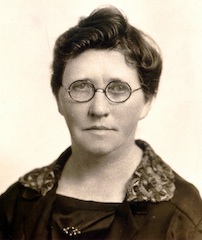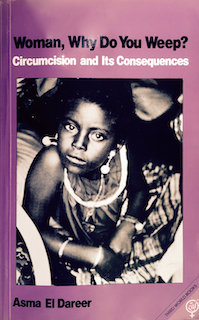
Female genital mutilation (FGM), also known as female genital cutting, female genital mutilation/cutting (FGM/C) and female circumcision, is the ritual cutting or removal of some or all of the external female genitalia. The practice is found in some countries of Africa, Asia and the Middle East, and within their respective diasporas. UNICEF estimated in 2016 that 200 million women in 30 countries—Indonesia, Iraq, Yemen, and 27 African countries including Egypt—had been subjected to one or more types of female genital mutilation.
Infibulation is the ritual removal of the external female genitalia and the suturing of the vulva, a practice found mainly in northeastern Africa, particularly in Djibouti, Eritrea, Ethiopia, Somalia, and Sudan. The World Health Organization refers to the procedure as Type III female genital mutilation. Infibulation can also refer to placing a clasp through the foreskin in men.
Janice G. Raymond is an American lesbian radical feminist and professor emerita of women's studies and medical ethics at the University of Massachusetts Amherst. She is known for her work against violence, sexual exploitation, and medical abuse of women, and for her controversial work denouncing transsexuality and the transgender rights movement.
Feminist anthropology is a four-field approach to anthropology that seeks to transform research findings, anthropological hiring practices, and the scholarly production of knowledge, using insights from feminist theory. Simultaneously, feminist anthropology challenges essentialist feminist theories developed in Europe and America. While feminists practiced cultural anthropology since its inception, it was not until the 1970s that feminist anthropology was formally recognized as a subdiscipline of anthropology. Since then, it has developed its own subsection of the American Anthropological Association – the Association for Feminist Anthropology – and its own publication, Feminist Anthropology. Their former journal Voices is now defunct.
Psychological anthropology is an interdisciplinary subfield of anthropology that studies the interaction of cultural and mental processes. This subfield tends to focus on ways in which humans' development and enculturation within a particular cultural group—with its own history, language, practices, and conceptual categories—shape processes of human cognition, emotion, perception, motivation, and mental health. It also examines how the understanding of cognition, emotion, motivation, and similar psychological processes inform or constrain our models of cultural and social processes. Each school within psychological anthropology has its own approach.

In the cultures of the Horn of Africa and adjacent regions of the Middle East, Zār is the term for a demon or spirit assumed to possess individuals, mostly women, and to cause discomfort or illness. The so-called zār ritual or zār cult is the practice of exorcising such spirits from the possessed individual.
Legal anthropology, also known as the anthropology of laws, is a sub-discipline of anthropology follows inter disciplinary approach which specializes in "the cross-cultural study of social ordering". The questions that Legal Anthropologists seek to answer concern how is law present in cultures? How does it manifest? How may anthropologists contribute to understandings of law?
Sondra Hale is Professor Emeritus of Anthropology and Gender Studies at the University of California, Los Angeles (UCLA); former Co-editor of the Journal of Middle East Women's Studies and former Co-Chair, Islamic Studies. Her regional interests are in Africa and the Middle East, focusing mainly on Sudan and Eritrea.
Nahid Toubia is a Sudanese surgeon and women's health rights activist, specializing in research into female genital mutilation.

The campaign against female genital mutilation in colonial Kenya (1929–1932), also known as the female circumcision controversy, was a period within Kenyan historiography known for efforts by British missionaries, particularly from the Church of Scotland, to stop the practice of female genital mutilation in colonial Kenya. The campaign was met with resistance by the Kikuyu, the country's largest tribe. According to American historian Lynn M. Thomas, female genital mutilation became a focal point of the movement campaigning for independence from British rule, and a test of loyalty, either to the Christian churches or to the Kikuyu Central Association, the largest association of the Kikuyu people.

Aihwa Ong is Professor of Anthropology at the University of California, Berkeley, a member of the Science Council of the International Panel on Social Progress, and a former recipient of a MacArthur Fellowship for the study of sovereignty and citizenship. She is well known for her interdisciplinary approach in investigations of globalization, modernity, and citizenship from Southeast Asia and China to the Pacific Northwest of the United States. Her notions of 'flexible citizenship', 'graduated sovereignty,' and 'global assemblages' have widely impacted conceptions of the global in modernity across the social sciences and humanities. She is specifically interested in the connection and links between an array of social sciences such as; socio cultural anthropology, urban studies, science technology, and is even interested in medicine and the arts.

Sudan is a developing nation that faces many challenges in regard to gender inequality. Freedom House gave Sudan the lowest possible ranking among repressive regimes during 2012. South Sudan received a slightly higher rating but it was also rated as "not free". In the 2013 report of 2012 data, Sudan ranks 171st out of 186 countries on the Human Development Index (HDI). Sudan also is one of very few countries that are not a signatory on the Convention on the Elimination of All Forms of Discrimination Against Women (CEDAW).
Ellen Gruenbaum is an American anthropologist. A specialist in researching medical practices that are based on a society’s culture.

Hulda Jane Stumpf was an American Christian missionary who was murdered in her home near the Africa Inland Mission station in Kijabe, Kenya, where she worked as a secretary and administrator.
Janice Clare Reid is an Australian academic and medical anthropologist, who has specialised in Aboriginal and refugee health. She was Vice-Chancellor of the University of Western Sydney from 1998 to 2013.
Asma Abdel Rahim El Dareer is a Sudanese physician known for her research in the 1980s into female genital mutilation. She was one of the first Arab women and feminist doctors to speak out publicly against the practice.
The Babiker Bedri Scientific Association for Women's Studies was formed in Sudan in 1979 after a symposium in February that year, "The Changing Status of Women in Sudan", at Ahfad University for Women in Omdurman. Open to educated women from Sudan, the association's early aims were to set up welfare and education programmes for women in the White Nile and Red Sea states, and to end female genital mutilation, which has a high prevalence in Sudan. Asma El Dareer was one of the association's presidents.
Female genital mutilation (FGM) is highly prevalent in Sudan. According to a 2014 Multiple Indicator Cluster Survey (MICS), 86.6 percent of women aged 15–49 in Sudan reported living with FGM, and said that 31.5 percent of their daughters had been cut. The most common FGM procedure in that country is Type III (infibulation); the 2014 survey found that 77 percent of respondents had experienced Type III.

Woman, Why Do You Weep? Circumcision and Its Consequences (1982) is a book by Sudanese physician Asma El Dareer about female genital mutilation in Sudan. Published in London by Zed Press in association with the Babiker Bedri Scientific Association for Women's Studies, the book summarizes research El Dareer conducted on female genital mutilation (FGM) for the medical faculty of the University of Khartoum.

Dr. Ina M Beasley was an English educator, author and lecturer, who worked in education in Sudan from 1939–1949.







